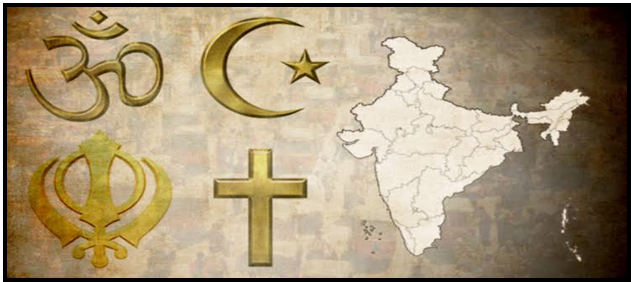THE RELIGIONIZATION OF INDIAN SOCIO-POLITICAL LIFE: RITUAL OVER PRINCIPLE
Syllabus:
- GS 1: Social Empowerment, Communalism, Regionalism & Secularism , Politics and Religion.
Focus:
- There’s an intriguing self-criticism among Hindutva’s opponents, suggesting their failure to recognize
the significance of Hinduism in India’s public life. Instead, they continued to adhere to Western concepts like secularism.
- Shift in Perspective: The narrative calls for acknowledging Hinduism’s inclusive nature, attempting to dissociate it from Hindutva’s exclusivist agenda.
Source: NewsClick
Understanding Link between Religion (Hindutva) and Politics:
Emergence of Religiosity
- Acceptance of Ritualistic Religion: The majority of Indians envision religion in overtly ritualistic terms, emphasizing ceremonies and traditions over philosophical principles.
- Institutionalization Strengthens Influence: The institutionalization of religious establishments further consolidates the influence of ritualistic religion in Indian society.
Political Consensus on Hindutva
- Rise of Hindutva: With the decline of secular politics, there’s a growing consensus across the political spectrum that temple-centric Hinduism epitomizes India’s national identity.
- Intellectual Investment: There’s significant intellectual and political investment in promoting Hindutva, Hinduism, and Indian civilization as defining features of the nation.
Philosophical vs. Ritualistic Aspects
- Ambedkar’s Distinction:R. Ambedkar delineated between the philosophical principles and ritualistic aspects of religion, advocating for a Religion of Principles.
- Political Reluctance: However, the political class has been reluctant to appreciate this distinction, often prioritizing rituals over principles.
Institutionalization of Ritualistic Religion
- Transformation of Religious Sites: Temples, mosques, churches, and other religious establishments have evolved into community institutions providing social services.
- Political Utility: Political parties benefit from the organized support and influence wielded by these institutionalized religious establishments.
Failure of Secular Politics:
- Neglect of Religion and Nationalism: Secular parties and left-liberal intellectuals historically overlooked the role of religion and nationalism in Indian society.
Example:
Babri Masjid Demolition:
The demolition of the Babri Masjid in 1992 was not perceived as a failure of secular politics. Instead, Hindutva was blamed for communalism.
Political Use of Ritualistic Religion
- Religious Practices for Political Gain: Both proponents and opponents of Hindutva engage with ritualistic Hinduism for political purposes, often aligning with popular sentiment rather than principles.
- Neglect of Ambedkar’s Vision: There’s a reluctance to embrace Ambedkar’s vision of a Religion of Principles, favouring instead the politically expedient path of ritualistic religion.
- Impact on Political Landscape: The institutionalization of ritualistic religion and its political utility reshape the socio-political fabric of the nation.
Effects of Mixing Religion with Politics:
Divisiveness: Mixing religion with politics often leads to the polarization of society along religious lines, fostering division and animosity between different religious communities.
Undermining Secular Values: It undermines the secular fabric of society by favouring one religion over others, thereby eroding the principles of equality, tolerance, and religious freedom.
Threat to Minority Rights: Religious politics can marginalize minority communities, threatening their rights and freedoms as they may face discrimination or persecution based on their religious beliefs.
Influence of Extremism: It can fuel religious extremism and fundamentalism, as political leaders exploit religious sentiments to gain power or manipulate public opinion, leading to radicalization and violence.
Interference in Governance: Mixing religion with politics can lead to religious institutions exerting undue influence on government policies and decision-making processes, compromising the impartiality and effectiveness of governance.
Stifling of Dissent: Political leaders who use religion as a tool may suppress dissent and criticism by labeling it as blasphemy or anti-religious, inhibiting free speech and democratic discourse.
Undermining Rule of Law: Religious considerations may take precedence over legal and constitutional principles, undermining the rule of law and leading to impunity for religiously motivated actions that violate human rights.
Economic Implications: Religious politics can divert attention and resources away from pressing socio-economic issues, leading to neglect of development initiatives and exacerbating poverty and inequality.
International Relations: Mixing religion with politics can strain diplomatic relations between countries, as religious conflicts spill over into international affairs, leading to regional instability and conflict.
Cultural Homogenization: Overemphasis on religious identity in politics can homogenize cultural diversity, suppressing indigenous traditions and minority cultures in favour of a dominant religious narrative.
| Study on Religious Beliefs
Pew Research Center’s Findings: · Studies indicate widespread belief in fate, astrology, and strong support for religious ceremonies, indicating the dominance of ritualistic religious practices. · This trend limits the exploration and promotion of the Religion of Principles advocated by Ambedkar. |
Way Forward:
- Analytical Examination Required: The religionisation of Indian politics warrants closer scrutiny, particularly in understanding the dominance of ritualistic religion over philosophical principles.
- Need for Revisiting Ambedkar’s Vision: There’s a pressing need to revisit Ambedkar’s vision of a Religion of Principles, which emphasizes critical engagement with religious practices and adherence to philosophical tenets.
- Balancing Tradition and Modernity: Indian society must strike a balance between traditional rituals and modern principles to foster a more inclusive and progressive socio-political environment.
- Call for Further Research: Further research and analysis are necessary to comprehend the complexities of religion in Indian socio-political life and its implications for governance and social cohesion.
Conclusion:
In conclusion, the editorial focuses on the religionization of Indian socio-political life, marked by the dominance of ritualistic practices and the political consensus on Hindutva, presents complex challenges to secular values, minority rights, and governance. However, by revisiting Ambedkar’s vision of a Religion of Principles and fostering a balance between tradition and modernity, India can strive towards a more inclusive and progressive society.
Source:
Mains Practice Question:
Discuss the phenomenon of the religionization of Indian socio-political life, focusing on the dominance of ritualistic practices over philosophical principles.




